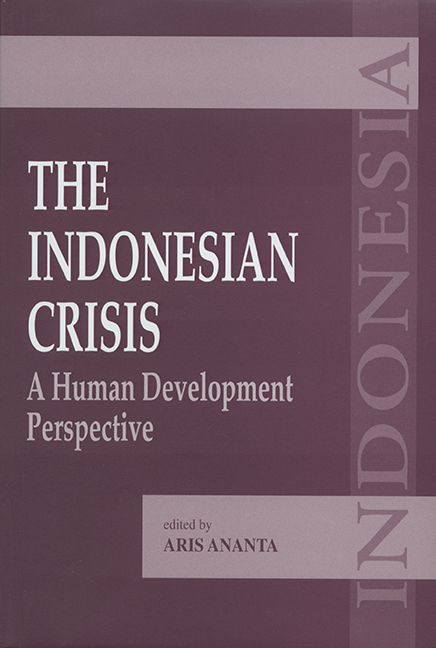Book contents
- Frontmatter
- Contents
- Acknowledgements
- List of Contributors
- Part I Introduction
- Part II Human Capital
- 5 Freedom from Fear: Social Disruption and System of Violence in Indonesia
- 6 Health Status of Indonesians During the Economic Crisis
- 7 The Indonesian Economic Crisis: Impacts on School Enrolment and Funding
- 8 Population Mobility and Social Conflict: The Aftermath of the Economic Crisis in Indonesia
- Part III Purchasing Power
- Part IV Emerging Issues
- Index
7 - The Indonesian Economic Crisis: Impacts on School Enrolment and Funding
from Part II - Human Capital
Published online by Cambridge University Press: 21 October 2015
- Frontmatter
- Contents
- Acknowledgements
- List of Contributors
- Part I Introduction
- Part II Human Capital
- 5 Freedom from Fear: Social Disruption and System of Violence in Indonesia
- 6 Health Status of Indonesians During the Economic Crisis
- 7 The Indonesian Economic Crisis: Impacts on School Enrolment and Funding
- 8 Population Mobility and Social Conflict: The Aftermath of the Economic Crisis in Indonesia
- Part III Purchasing Power
- Part IV Emerging Issues
- Index
Summary
Introduction
The impacts of the economic crisis in Indonesia on education enrolments and drop-out rates have not been as devastating as initially feared. School incomes, however, have been hit hard by the crisis.
This chapter examines how the crisis has affected key educational indicators since the 1997/98 academic year. The findings of the study reflect the authors’ analysis of several previously published sources of data from the Central Independent Monitoring Unit (CIMU), which independently monitors and evaluates the Scholarships and Grants Programme (SGP), one component of the Indonesian Social Safety Net programme. The CIMU has published a number of reports on the economic crisis, education, and the Scholarships and Grants Programme.
The analysis begins with a description of the education system, summarizing the policy focus at the time when the crisis first struck Indonesia. Detailed findings from the CIMU national survey data are used to describe the varying effects of the crisis on education. Other data sources are also examined to determine the consistency of findings from the CIMU data with those from other sources. The chapter concludes with an analysis of the impact of the Scholarships and Grants Programme, a major donor-supported government intervention to mitigate the effects of the crisis on the school system.
The Indonesian Educational System and Development
The Indonesian education system consists of several levels, including pre-school, primary school, junior secondary school, senior secondary school, and a range of post-secondary education programmes. According to Indonesian law No. 2/1989, basic education lasts for nine years, consisting of six years of primary school plus three years of junior secondary school.
Management responsibility for education falls on several different government ministries. The Ministry of National Education manages the general primary schools, junior secondary schools, and senior secondary schools. However, the general primary schools are not only managed by the Ministry of National Education but also by the Ministry of Home Affairs. The Ministry of Religious Affairs administers some primary schools known as Madrasah Ibtidaiyah (MI), some junior secondary schools known as Madrasah Tsanawiyah (MTs), and some senior secondary schools known as Madrasah Aliyah (MA).
- Type
- Chapter
- Information
- The Indonesian CrisisA Human Development Perspective, pp. 182 - 212Publisher: ISEAS–Yusof Ishak InstitutePrint publication year: 2002

